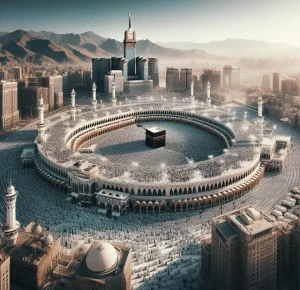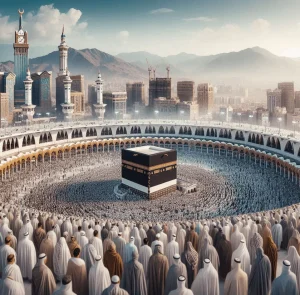Table of Contents
Eid al Adha holds profound significance within Islam, symbolizing not only the obedience and sacrifice of Prophet Ibrahim but also serving as a reminder of the importance of faith, charity, and community. In the Quran, the holy book of Islam, the narrative of Eid al Adha is richly woven, offering layers of insight into its spiritual essence and teachings.

The Narrative of Sacrifice
The Quran recounts the story of Prophet Ibrahim’s unwavering obedience to God’s command to sacrifice his beloved son, Isma’il. This narrative unfolds with gripping detail, portraying Ibrahim’s profound devotion and Isma’il’s submission to the divine will. As Ibrahim raises the blade, ready to fulfill the command, God intervenes, providing a ram as a substitute sacrifice, affirming Ibrahim’s faith and commitment.
Rituals and Traditions
Eid al Adha is marked by various rituals and traditions that reflect its Quranic origins. The act of sacrificing an animal, usually a sheep, goat, or cow, symbolizes Ibrahim’s readiness to sacrifice Isma’il and demonstrates submission to God’s command. The meat from the sacrificed animal is divided into three parts: one-third for the family, one-third for relatives and friends, and one-third for the needy and less fortunate, embodying the principles of charity and generosity.
Spiritual Reflection
The observance of Eid al Adha offers Muslims an opportunity for spiritual reflection and introspection. It prompts believers to contemplate the sacrifices made by Ibrahim and Isma’il and to reflect on their own willingness to submit to God’s will. It serves as a reminder of the transient nature of worldly possessions and the eternal rewards of piety and righteousness in the Hereafter.
Symbolism and Lessons
Eid al Adha encapsulates myriad lessons encapsulated within this narrative. It underscores the importance of obedience to God’s commands, even when they demand great sacrifice. It exemplifies trust in divine providence and the belief that God’s wisdom surpasses human understanding. Moreover, it emphasizes the significance of generosity and compassion, as demonstrated by Ibrahim’s willingness to sacrifice his most cherished possession.
Spiritual Reflection
Delving deeper into the Quranic verses pertaining to Eid al Adha, one encounters layers of spiritual reflection. Surah As-Saffat (37:100-112) vividly portrays Ibrahim’s unwavering faith and God’s mercy, underscoring the eternal reward for those who demonstrate submission and piety. Surah Al-Anbiya (21:107-112) echoes this theme, emphasizing the righteousness of Ibrahim and the enduring legacy of his faith.
Rituals and Observances
Eid al Adha is marked by various rituals and observances that reflect its Quranic origins. The act of sacrificing an animal symbolizes Ibrahim’s readiness to sacrifice Isma’il and serves as a reminder of the importance of selflessness and devotion. The distribution of meat among family, friends, and the less fortunate embodies the spirit of generosity and community solidarity, echoing the Quranic injunction to share blessings with others.
Commemoration and Celebration
Beyond its spiritual dimensions, Eid al Adha is a time of celebration and commemoration for Muslims worldwide. It fosters a sense of unity and belonging as families gather to offer prayers, exchange greetings, and partake in festive meals. The spirit of Eid al Adha permeates mosques, homes, and communities, fostering an atmosphere of joy, gratitude, and reflection.
Quranic Verses on Sacrifice
The Quran contains numerous verses that expound upon the concept of sacrifice and its significance in Islam. Surah Al-Baqarah (2:196-197) exhorts believers to perform the ritual of sacrifice with sincerity and reverence, emphasizing its role in commemorating the legacy of Ibrahim. Surah Al-Hajj (22:34-37) underscores the spiritual dimension of sacrifice, highlighting its connection to piety and righteousness.
Eid al Adha
Eid al Adha is more than just a religious holiday; it is a profound testament to faith, sacrifice, and divine mercy. Its Quranic roots imbue it with depth and meaning, inviting believers to reflect on the timeless lessons embedded within its narrative. As Muslims across the globe commemorate this sacred occasion, they are reminded of the enduring legacy of Prophet Ibrahim and the timeless wisdom of the Quran. May Eid al Adha serve as a source of inspiration, unity, and spiritual renewal for all who observe it.






More Stories
Tales of Wonder: Unraveling the Islamic Heritage Mystery
In the Footsteps of Greatness: Journeying Through Islamic Heritage Sites
Echoes of History: Rediscovering Islamic Heritage Around the World